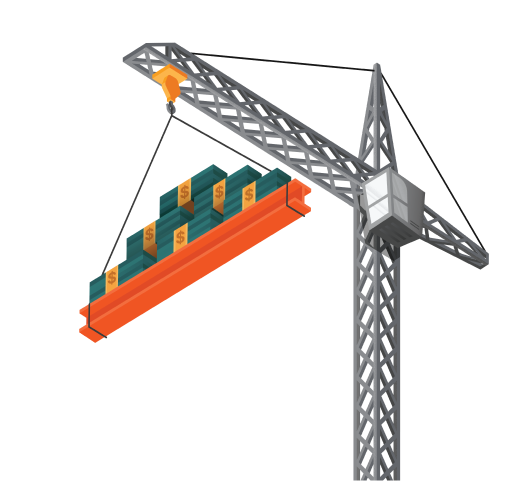— 5 min read
7 Tips to Improve Accounts Payable in Construction
Last Updated Feb 21, 2024

The importance of accurate accounts payable and other accounting records in the construction business cannot be overstated. Managing accounts payable — ensuring accurate records and quick payments — is the key to all construction companies staying in business.
Learn more: The basics of construction accounting
Contents
Table of contents
What is accounts payable in construction?
"Accounts payable" is a term for the money you owe to vendors and subcontractors for business costs and expenses. It includes all types of costs, including overhead, direct costs, and indirect costs.
Bills that are unpaid — from the time the vendor bills you until you make a payment — are considered your company’s accounts payable. Obviously, the number of outstanding bills will fluctuate. It’s similar to accounts receivable in this way.
The payment of accounts payable is often linked to payments received in accounts receivable — especially in construction. In other words, companies are often unable to pay their bills until they receive payment from their customers. This is most often the case for direct costs for projects: Overhead and general business expenses are usually paid as they are received.
To maintain cash flow and ensure you make a profit, it's important to have an accurate accounts payable total — you'll be basing your customer billings on that.
7 tips to improve accounts payable management
Managing accounts payable means ensuring that all invoices have been accounted for and that they get paid in a timely fashion. Having a process for doing this is essential as your business grows. Here are some ways you can improve your accounts payable management.
1. Designate one person or email address to receive all invoices
Designating a singular person or email address to receive all invoices helps prevent confusion on the part of your vendors about who to send the invoices to — and makes it easier for you to track if an invoice has been received.
You should also encourage your vendors to email invoices instead of faxing or mailing them, as emailed invoices can easily be recalled and reprinted.
2. Enter all invoices in your accounting software as they come in
Entering invoices as they come in creates a record showing that the invoice exists, and you can then track it down if the hard copy gets misplaced.
Doing this before distributing the invoices for approval or coding ensures that you’ve got a record of all incoming accounts payable. If you send your invoices to management for approval before entering them into your software, there’s no way to know that the invoice was received. This can lead to lost invoices and unaccounted-for expenses.
3. Track retainage owing and paid
Make sure you are accurately tracking the retainage that is owed to your subcontractors. Retainage is recorded separately from accounts payable, since it is typically not payable in the current period. Instead, contractors typically track it in a separate account called "retention payable" or "accounts payable - retention." Once the subcontractor invoices for retained funds, it is moved from retention payable to accounts payable.
Assuming your chart of accounts is set up correctly, most construction accounting software will record retainage in the correct account automatically. If you’re using a generic accounting program, recording retainage payments may require a manual process.

4. Go paperless
Scan or save copies of accounts payable invoices to your server or cloud storage system. By doing this, you’ll ensure you always have a copy of every invoice, even if something happens to the paper copy.
You should also take advantage of digital routing and approval processes if your accounting software allows them. These processes reduce the chance of lost invoices and help ensure that all costs are recorded in the accounting system.
5. Run regular accounts payable reports
Most software packages allow you to enter payment due dates for accounts payable invoices. Use these dates to filter your reports so you know how much is due at any one time.
By reviewing the amounts due on a certain date, you can put together an accurate cash flow projection, showing how much is due each week or month. These amounts should inform your job billings, so you can ensure you are billing enough to cover all your expenses.
6. Schedule payments at regular intervals
Have a regular payment schedule that you stick to as much as possible. Set specific days of the month or a day of the week that you make payments on invoices that are due. For example, you could pay bills every first and fifteenth day of the month, or every Wednesday.
Since invoices have different due dates, you’ll need to review these to determine when’s the best time to make your payments. As often as once a week is usually a good place to start, as this allows you to address urgent payments as well as keep current with necessary services such as utilities.
7. Note any joint check payees and amounts on the invoice
If a subcontractor or supplier needs to get a joint check, make a note on the invoice or in your software so the person creating the checks can see it. This is particularly important if the person creating the checks is different from the person who entered the invoice and knows about the joint check.
Managing accounts payable with an eye on cash flow
Tracking and paying accounts payable accurately and in a timely fashion is essential for any construction business to help manage its cash flow.
Additionally, taking advantage of tools like construction accounting software and electronic routing of invoices make this process easier and quicker. Running regular accounts payable reports and scheduling regular payments will help you predict your cash flow needs so you can plan your customer billings and know your cash standing.
Categories:
Tags:
Written by
Dawn Killough
33 articles
Dawn Killough is a writer with over 20 years of experience in construction, having worked as a staff accountant, green building advisor, project assistant, and contract administrator. She shares fundamental green building strategies and techniques in her book, Green Building Design 101. Dawn lives in Portland, Oregon.
View profileWin More Work
Get discovered for relevant work on the Procore Construction Network.

Explore more helpful resources

Navigating Obstacles in Construction Cost Management
The financial stability of construction firms often hinges on their ability to effectively manage costs, a key factor in keeping projects within budget and securing profitability. The process of cost...

Construction Project Over Budget? Common Causes & Solutions
On construction projects, going over budget is an all-too-common scenario. This situation is more than a mere miscalculation: It can fundamentally alter the trajectory and outcome of a construction project...

The Completed Contract Method of Accounting in Construction
Most construction companies earn revenue and pay job costs throughout the duration of each project. They record income and expenses using the Percentage of Completion method of accounting, which provides...

Financial Audits in Construction: How to Prepare for & Manage an Audit
Financial audits are not something people look forward to facing — the process is intended to find mistakes and weak points — but regular audits can improve the overall health...
